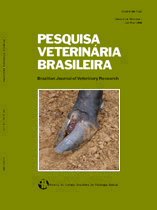 |
|
|
|
Year 2009 - Volume 29, Number 11
|

|
Cytological and microbiological aspects of milk in farms with an organic system of production, 29(11):881-886
|
ABSTRACT.- Langoni H., Sakiyama D.T.P., Guimarães F.F., Menozzi B.D. & Silva R.C. 2009. [Cytological and microbiological aspects of milk in farms with an organic system of production.] Aspectos citológicos e microbiológicos do leite em propriedades no sistema orgânico de produção. Pesquisa Veterinária Brasileira 29(11):881-886. Departamento de Higiene Veterinária e Saúde Pública, Faculdade de Medicina Veterinária e Zootecnia, Universidade Estadual Paulista, Campus de Botucatu, Distrito de Rubião Júnior s/n, Botucatu, SP 18618-000. E-mail: hlangoni@fmvz.unesp.br
Nowadays, farmers have great interest in milk production within an organic system due to the consumers’ claim for natural products. The purpose of this paper was to study the cytological and microbiological quality of milk produced by four farms in the county of Botucatu, SP, which use organic system management. A total of 150 mammary gland milk samples were tested by CMT and Somatic Cell Count (SCC/mL milk), microbiological examination, and Colony Former Unit Count (CFU mesophile microrganisms/mL milk). From these individual milk samples, 66 (44.0%) were CMT positive. Corynebacterium bovis was isolated from 37.9% milk samples, Staphylococcus aureus from 18.2%, S. epidermidis from 15.2%, Streptococcus uberis from 3.0%, and S. dysgalactiae from 3.0%. Association of at least two different bacteria species was observed in 7.6% samples. In respect to the whole milk of each farm, the SCC/mL values were in normal limits on three of them (i.e. lower than 400x103), and considering the CFU/mL, on three farms high levels were observed (8,5x105; 1,5x106; 4,1x105). From the individual milk samples, contagious mastitis pathogens were isolated predominantly, but environmental microorganisms were detected from the whole milk, as Escherichia coli and Pseudomonas aeruginosa, probably due to contamination during and/or after milking. The results suggest that more than mastitis problems, the four farms studied have hygienic deficiencies, what strengthens the importance of sanitary education to achieve a better milk hygiene quality. |
| |
|
|
| |
|
 |